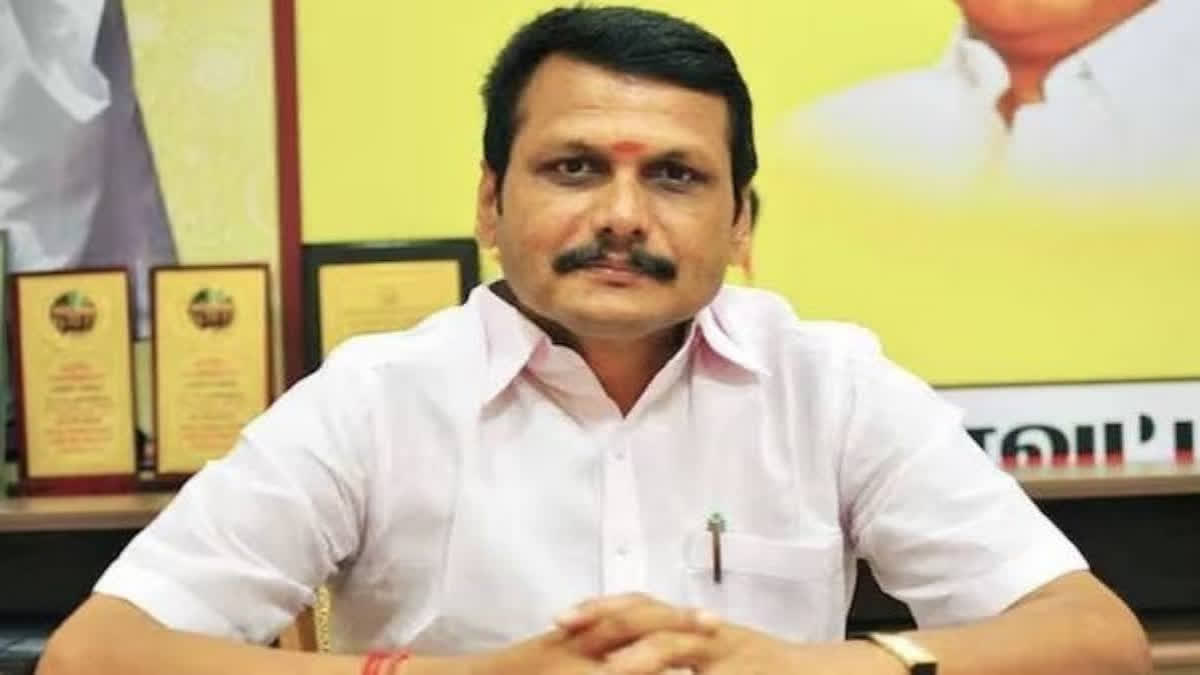New Delhi:The Supreme Court on Thursday granted bail to former Tamil Nadu minister and DMK strongman Senthil Balaji in a money laundering case linked to the cash-for-jobs scam, saying that "it will amount to an infringement of his fundamental right under Article 21 of the Constitution of India of speedy trial".
A bench led by Justice Abhay S Oka and comprising Justice Augustine George Masih said that Balaji has been incarcerated for 15 months or more for the offence punishable under the Prevention of Money Laundering Act (PMLA) and, in the facts of the case, the trial of the scheduled offences and, consequently, the PMLA offence is not likely to be completed in three to four years or even more.
"If the appellant's detention is continued, it will amount to an infringement of his fundamental right under Article 21 of the Constitution of India of speedy trial," said Justice Oka, who authored the judgment on behalf of the bench.
Solicitor General Tushar Mehta, representing the Enforcement Directorate, contended that Balaji’s influential position in the state may have resulted in a so-called compromise between the bribe givers and the bribe takers. The top court noted that there is also prima facie material to show a deposit of cash amount of Rs.1.34 crore in Balaji's bank account.
The bench said Balaji’s contention regarding the deposit of remuneration received as MLA and agriculture income cannot be accepted in the absence of any prima facie evidence to show the existence of the appellant's cash income as MLA and the appellant's agriculture income.
"Therefore, at this stage, it will be very difficult to hold that there is no prima facie case against the appellant in the complaint under Section 44 (1)(b) of the PMLA and material relied upon therein”, said the bench.
"Considering the apprehension of the appellant tampering with the evidence, stringent conditions must be imposed," said the bench.
The apex court directed Balaji to furnish bail bonds in the sum of Rs 25 lakh with two sureties in the like amount. The bench made it clear that he should not directly or indirectly attempt to contact or communicate with the prosecution witnesses and victims of the three scheduled offences in any manner.
"If it is found that the appellant directly or indirectly made even an attempt to contact any prosecution witness or victim in the scheduled as well as offences under the PMLA, it will be a ground to cancel the bail granted to the appellant”, said Justice Oka.
Justice Oka said Balaji should mark his attendance every Monday and Friday between 11 am and 12 noon in the office of the deputy director, the Directorate of Enforcement at Chennai.
"He shall also appear on the first Saturday of every calendar month before the investigating officers of the three scheduled offences," said the bench.
The apex court directed Balaji to surrender his passport to the special court under the PMLA at Chennai before he is enlarged on bail. "The appellant shall regularly and punctually remain present before the courts dealing with scheduled offences as well as the Special Court and shall cooperate with the courts for early disposal of cases. If the appellant seeks adjournments on non-existing or frivolous grounds or creates hurdles in the early disposal of the cases mentioned above, the bail granted to him shall be liable to be cancelled," said Justice Oka.
The bench said that even in ideal conditions, the possibility of the trial of scheduled offences concluding even within a reasonable time of three to four years appears to be completely ruled out. Hence, the existence of a scheduled offence is sine qua non for alleging the existence of proceeds of crime, it added.
The bench said the existence of proceeds of crime at the time of the trial of the offence under Section 3 of PMLA can be proved only if the scheduled offence is established in the prosecution of the scheduled offence.
"Therefore, even if the trial of the case under the PMLA proceeds, it cannot be finally decided unless the trial of scheduled offences concludes. In the facts of the case, there is no possibility of the trial of the scheduled offences commencing in the near future. Therefore, we see no possibility of both trials concluding within a few years," said Justice Oka.
The apex court judgment came on an appeal filed by Balaji challenging the Madras High Court order, which dismissed his bail plea. The High Court had said that he was likely to influence witnesses if enlarged on bail and also from the health report of Balaji it did not appear to be a medical condition which could be taken care of only if he was released on bail.
In June last year, the ED arrested Balaji in connection with a money laundering case linked to a cash-for-jobs scam when he was the transport minister during the AIADMK regime.
